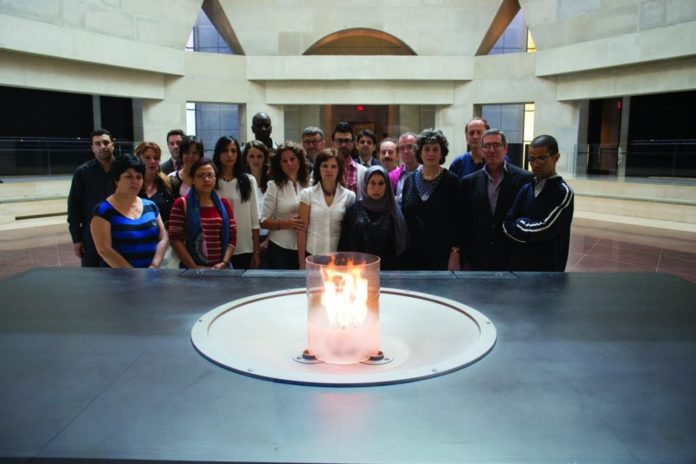 |
The South African Holocaust & Genocide Foundation (SAHGF) is increasingly being called upon to provide a model for how Holocaust history and its contemporary relevance can be taught around the world.
After the end of apartheid, the South African Department of Education drafted a new school curriculum with a strong human rights focus. Thus, since 2007, the national History curricula for Grades 9 and 11 have included the study of Nazi Germany and the Holocaust.
Supporting the national curriculum, the SAHGF has carefully developed
educational materials and resourcesfor the South African context, which are utilised in the foundation’s education programmes for adult groups, high school educators and learners at its centres in Cape Town, Durban, Johannesburg and throughout the country.
It is this model that is drawing increasing attention from international organisations, educators and academics, who are interested in incorporating Holocaust education into school curricula, especially in countries that do not have direct ties to Holocaust history. In a recent feature article in The Economist on the expanding interest in Holocaust education worldwide, SAHGF Director Richard Freedman explained aspects of how this has been done in South Africa:
“There are very close parallels between Germany’s establishment of a racial state in 1933-39 and South Africa’s apartheid state — the separation of communities, the ban on mixed marriages — it’s a powerful link.” Lessons for humanity Now, the SAHGF’s work and context is being called upon to provide a possible model for Holocaust education. In 2012, the SAHGF was part of a UNESCO consultation on Holocaust and genocide education in sub-Saharan Africa, which was held at the Cape Town Holocaust Centre (CTHC) with representatives from 14 African countries. CTHC Education Director Tracey Petersen took part in a similar consultation in South America. In September, Freedman was invited to present at the United States Holocaust Memorial Museum (USHMM) and Salzburg Global Seminar International Educator Institute on Global Practices in Holocaust Education in Washington, DC. “Participants, particularly from countries where Holocaust education is not available, found his presentation ‘South African Perspectives: A Case Study’ very inspiring and motivating,” reported the Weekly Press Pakistan newspaper. “It brought into focus how a motion passed by the South African parliament introduced Holocaust education into its school curriculum.”
Freedman also presented on theSAHGF’s work at the Aladdin Project’s international seminar on Holocaust education, in conjunction with the USHMM and the International Holocaust Remembrance Alliance, which took place in Istanbul in October 2013.
Launched in 2009, the Aladdin Project encourages Jewish-Muslim dialogue and promotes greater awareness of the Holocaust in the Middle East. The seminar gathered more than 40 scholars, senior officials and educators from North America, Europe, the Middle East and Africa, and representatives of UNESCO and the Council of Europe for an exchange of views and sharing of ideas and experiences on how the history of the Nazi genocide can be taught in South-East Europe, the Middle East, West Asia and North Africa. “It was very gratifying to hear from the former Iraqi minister of Human Rights, Bakhtiar Amin, that the model of Holocaust education developed in South Africa could be used throughout the Middle East region and South East Europe,” said Freedman following the seminar.
“Comments from participants showed that the successful introduction of Holocaust education in South Africa was an inspiration to those countries who were grappling with the rationale for, and manner in which, Holocaust education could be adapted to their regional contexts.”
Learners, educators and members of the public who have attended the SAHGF’s programmes demonstrate the impact of Holocaust education. “It is fantastic how the centre relates the events and lessons of the past to our lives today,” said a learner from Rustenburg Girls High School; while one policeman wroteafter a workshop: “A life changing experience — I’m so much more aware of issues of prejudice and racism.
From now on I’ll be able to deliver a more professional service.” The SAHGF’s work includes daily learner workshops and diversity training programmes for a variety of adult groups, ranging from Correctional Services to corporates; students to NGOs. In addition, a SAHGF team travels across the country — including many rural areas — offering in-service training for educators; supported by a generous grant from the Conference on Jewish Material Claims against Germany. This includes providing educators with teaching materials and resources. Since 2008, the SAHGF has reached 2588 educators and, in turn, over 350 000 high school learners per annum have been taught Holocaust history and its lessons for humanity.
This kind of reach demonstrates what is possible when introducing similar models of Holocaust education in other countries, and the SAHGF is continually involved in sharing its insights and expertise with organisations ranging from UNESCO to universities, museums and institutes. In the context of these impressive numbers, it is often the words of individuals that demonstrate the greatest impact. As a learner commented after an education programme at the Cape Town Holocaust Centre, “Learning about the Holocaust can open people’s eyes and show them what racism can lead to.”
For more information visit www.holocaust.org.za or contact Richard Freedman











